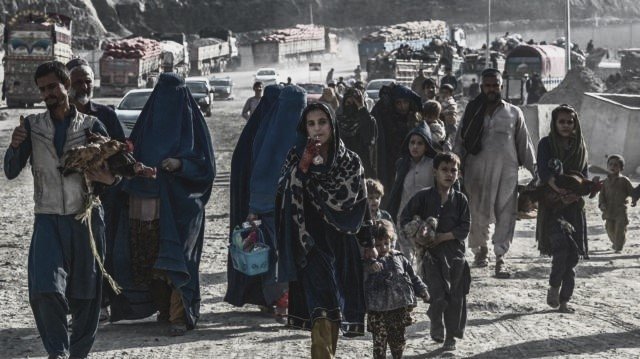Pakistan expelling Afghans who worked with US forces
Pakistan is starting to enforce its plan to repatriate more than a million “illegal” Afghans present in the country. Until yesterday, they could leave voluntarily. Many legal refugees have also been rounded up for expulsion. The US sent Pakistan a list of Afghans who worked with US forces, but Islamabad rejected it. Domestic politics and attacks by Pakistani Taleban are behind the repatriation policy.
Islamabad (AsiaNews/Agencies) – The Afghans expelled in recent days from Pakistan include thousands of asylum seekers and people who worked with US and allied forces during the 20 years of war in Afghanistan, individuals who had been promised a visa for the United States.
A month ago, the Pakistani government announced its decision to expel all illegal migrants, setting 1 November as the deadline for voluntary departure.
At least 200,000 people left of their own accord, avoiding arrest by Pakistani security forces. Videos of Afghan children saying goodbye to classmates before leaving have been posted on social media.
Despite criticism from the United Nations and several humanitarian groups, people have been rounded up in some cities (including legitimate refugees), crammed onto lorries and into buses to be taken to border crossings.
According to Interior Minister Sarfraz Bugti (in Pakistan’s caretaker government until elections in January 2024), 1.7 million Afghans are unregistered and live in the country "illegally".
The United Nations notes that two million undocumented Afghans are in the country, plus almost 1.3 million refugees with proof of registration (PoR) and another 880,000 who have the legal right to remain in the country. Some 600,000 to 700,000 fled after the Taliban took Kabul again in August 2021.
The migrants that the Pakistani government wants to repatriate to Afghanistan include people who have applied for asylum (about 60,000) after the US withdrawal, people with expired PoR cards but no recourse for renewal, and even Afghans waiting for visas to third countries.
US officials say they have given Pakistani authorities a list of some 25,000 Afghans who could be eligible for relocation to the United States under a special immigration programme (which has slowed down) for their services during the two-decade-long presence of US forces in Afghanistan.
Yesterday, a Pakistani official told the Voice of America that his government rejected the list due to significant discrepancies. The list was reviewed "but we found it imperfect and incomplete," said the official, who spoke on condition of anonymity.
Washington is expected to review the list in the coming days and give Afghan nationals documents to present to Pakistani authorities to prevent (or at least delay) repatriation.
Afghans jailed for "minor crimes" were released only to be taken with others to the border for repatriation.
“This action is a testament to Pakistan’s determination to repatriate any individuals residing in the country without proper documentation,” Minister Bugti wrote on X (ex-Twitter).
Still, according to several experts, although the Taliban have set up temporary refugee camps across the border, the country is not in a position to welcome the return of thousands of people.
For the past two years, Afghanistan has had to cope with a severe humanitarian crisis. At least 15 million people suffer from severe food insecurity, which has been aggravated by natural disasters such as floods, earthquakes, and increasingly frequent droughts.
Experts note that Pakistan has welcomed Afghan refugees for decades, but has also carried out forced repatriations in the past, which is why Afghans have increasingly tried to head to Europe rather than stay in the region.
But this time, the scale of expulsions is unprecedented, largely due to domestic politics and the deterioration of relations between the two South Asian countries.
Afghan migrants have also long been scapegoated, accused by Pakistani authorities of helping terrorists and, indirectly, hindering the country's economic recovery by "stealing” jobs from Pakistanis.
In reality, Pakistan’s long-standing support for the Taliban has backfired in the past two years as its own homegrown Tehrik-e-Taliban Pakistan (TTP), galvanised by the victory of their Afghan "cousins", have gone after government assets and institutions with the aim of setting up an Islamic Emirate in Pakistan.
It is no coincidence that Afghan Taliban authorities have recently issued a fatwa banning their own forces from conducting attacks in Pakistan.
From the Taliban perspective, violence in their neighbour is not jihad, which the “Quranic students" reserved for their 20-year war against the United States.
In order to reduce tensions with Pakistan, several TTP fighters were moved last June to central Afghanistan, away from the border, but this does not seem to have worked.
In Pakistan, where the military is the real power, the caretake government, which will be replaced early next year, has been criticised but without any particular consequences.
With respect to Western criticism, Bugti simply noted that expulsions are entirely legitimate since they are now being implemented by several countries, including in the West.
11/08/2017 20:05







.png)










